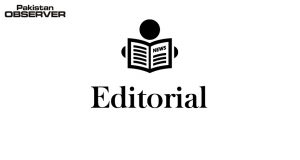AFTER his election as new Leader of the House in the National Assembly, formerly Leader of the Opposition and President of PML(N) Mian Shahbaz Sharif is beginning his first-ever stint as Prime Minister of Pakistan in the backdrop of both expectations and apprehensions about what is in store for him and what he does to handle the situation within the limited time at his disposal.
He would be presiding over a broad-based or multi-party government with its constituents having conflict of interests, a highly volatile opposition that has just been voted out, worsening economic conditions and masses who have pinned great hopes on him for urgent and medium-term relief in the face of crushing price-hike.
Shahbaz Sharif is widely known as a deliverer, reconciliatory and a leader with passion for progress and development — qualities he proved beyond any doubt during his tenures as Chief Minister of Punjab.
In fact, he set such high standards of good governance and delivery in Punjab that became yardstick to judge performance of his successor Usman Buzdar, who could not match the Shahbaz speed and, therefore, became one of the major liabilities for former Prime Minister Imran Khan.
The challenges are really daunting but Shahbaz Sharif has the vision and mettle to take upon them and otherwise too he has no choice as it is now a question of his own political future and that of his party.
His first task would be to accommodate his coalition partners in the formation of the cabinet and hopefully all parties would nominate their best brains so that the country is brought out of the existing mess in the shortest possible time.
The parties forming the coalition must realize that there is no room for any mistake as success or failure of Shahbaz government will have a bearing for all of them in their areas of influence.
It is to be seen what economic plan Shahbaz unfolds to put an effective brake on the downslide, which is quite visible from all major economic indicators and what measures he takes to address the price-hike, which is number one issue for the people and that was the main grievance of the common man against Imran Khan Government.
The gravity of the situation can be judged by the fact that the current account deficit is on path to touch $21 billion, highest in the history of the country; foreign exchange reserves have dropped to a low of $11.
3 billion and the country is facing worst load-shedding despite having surplus electricity generation capacity.
Economic experts widely believe that the genie of inflation can be put back into the bottle if a prudent exchange rate policy is devised and followed and this will have to be done with a speed.
Under pressure from the IMF, the previous Government increased the burden of taxes on people and its policy of withdrawing tax exemptions on food items increased problems of the people.
It will be seen what the new Government would be able to offer to its employees and pensioners in the coming budget as it cannot afford to ignore the plight of fixed income groups ahead of general election.
There would also be a need to do damage control in the realm of foreign affairs in the backdrop of recent tendency to use sensitive foreign policy issues for point-scoring on the domestic front.
It is also an undeniable fact that the work on the historic China-Pakistan Economic Corridor (CPEC) initiative slowed down considerably during the last three and a half years and renewed efforts will have to be made to accelerate the pace of implementation as well as its expansion to include more projects and programmes under its framework for overall socio-economic development.
The most important task before the new Government would be to heal the political wounds as the society stands polarized because of extreme positions adopted by the political parties and political leaders.
PTI has already declared its intention to give a tough time to the Government through street agitation as well as the politics of resignations.
PML(N) Government handled the issue of resignations of PTI parliamentarians quite well in its previous tenure and hopefully it would tackle it in a similar manner now.










